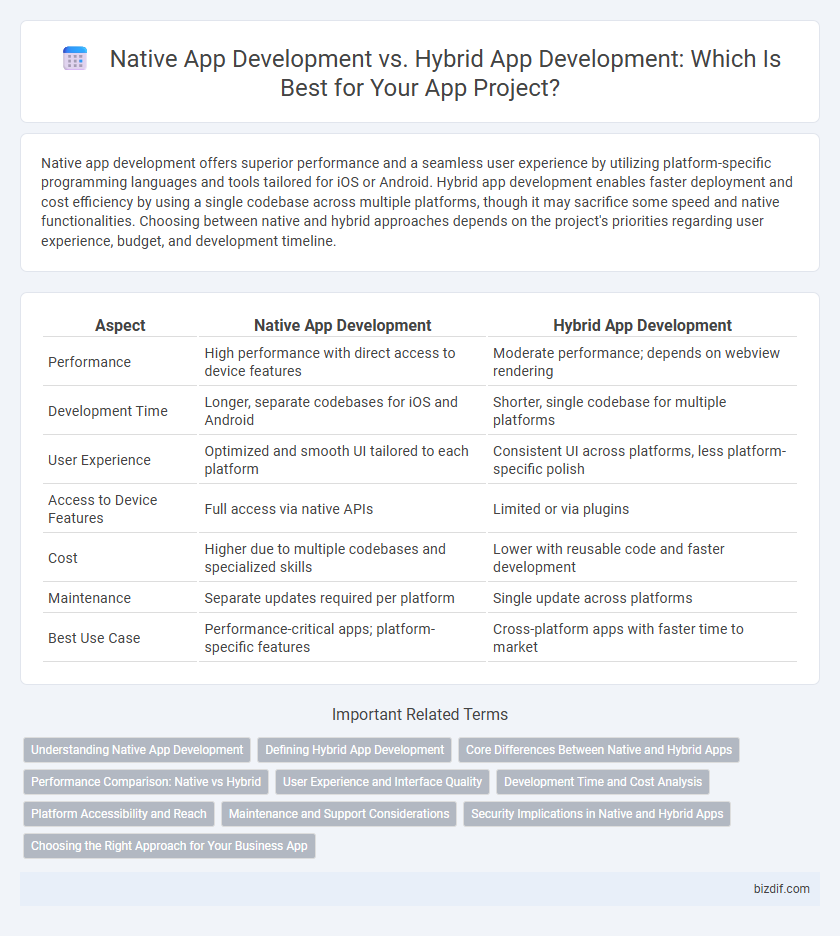Native app development offers superior performance and a seamless user experience by utilizing platform-specific programming languages and tools tailored for iOS or Android. Hybrid app development enables faster deployment and cost efficiency by using a single codebase across multiple platforms, though it may sacrifice some speed and native functionalities. Choosing between native and hybrid approaches depends on the project's priorities regarding user experience, budget, and development timeline.
Table of Comparison
| Aspect | Native App Development | Hybrid App Development |
|---|---|---|
| Performance | High performance with direct access to device features | Moderate performance; depends on webview rendering |
| Development Time | Longer, separate codebases for iOS and Android | Shorter, single codebase for multiple platforms |
| User Experience | Optimized and smooth UI tailored to each platform | Consistent UI across platforms, less platform-specific polish |
| Access to Device Features | Full access via native APIs | Limited or via plugins |
| Cost | Higher due to multiple codebases and specialized skills | Lower with reusable code and faster development |
| Maintenance | Separate updates required per platform | Single update across platforms |
| Best Use Case | Performance-critical apps; platform-specific features | Cross-platform apps with faster time to market |
Understanding Native App Development
Native app development involves creating applications specifically for a single platform using platform-specific programming languages such as Swift for iOS and Kotlin for Android, ensuring optimal performance and seamless integration with device features. This approach allows developers to leverage native APIs and hardware capabilities, resulting in faster load times, smoother animations, and enhanced user experience compared to hybrid apps. Despite higher development costs and longer timelines, native apps provide superior security, maintainability, and access to the latest platform updates.
Defining Hybrid App Development
Hybrid app development combines elements of both native and web applications, using frameworks like React Native, Flutter, or Ionic to build cross-platform apps with a single codebase. This approach allows developers to write code once and deploy it across iOS and Android, reducing development time and costs compared to native app development. Hybrid apps access device features through plugins, balancing performance and flexibility but sometimes sacrificing the full native experience.
Core Differences Between Native and Hybrid Apps
Native apps are developed specifically for a single platform using platform-specific programming languages like Swift for iOS or Kotlin for Android, offering superior performance, enhanced security, and seamless access to device features. Hybrid apps combine web technologies such as HTML, CSS, and JavaScript within a native container, enabling cross-platform compatibility but often with reduced speed and limited access to advanced device functionalities. Core differences include native apps' optimized user experience and responsiveness versus hybrid apps' cost-effectiveness and easier maintenance across multiple platforms.
Performance Comparison: Native vs Hybrid
Native app development delivers superior performance by directly utilizing device-specific hardware and optimized APIs, resulting in faster load times, smoother animations, and better responsiveness. Hybrid apps, built with web technologies inside a native container, often face performance bottlenecks due to extra abstraction layers and limited access to device features. For performance-critical applications, native development is preferred to ensure optimal speed, reliability, and resource management.
User Experience and Interface Quality
Native app development delivers superior user experience and interface quality by leveraging platform-specific APIs and design guidelines, resulting in smoother performance and more intuitive navigation. Hybrid app development often compromises on seamless interaction and responsiveness due to its reliance on web technologies and abstraction layers. Developers prioritize native solutions when optimal UI responsiveness, fluid animations, and precise hardware integration are critical for user engagement.
Development Time and Cost Analysis
Native app development generally requires a longer development time and higher costs due to platform-specific coding for iOS and Android, demanding specialized skills and extensive testing. Hybrid app development offers a cost-effective and faster solution by enabling a single codebase to run across multiple platforms, reducing maintenance efforts. However, the trade-offs include potential performance issues and limited access to device-specific features compared to native apps.
Platform Accessibility and Reach
Native app development offers optimized performance and seamless integration with specific platforms like iOS and Android, ensuring superior user experience and access to device-specific features. Hybrid app development enables broader platform accessibility by allowing a single codebase to run across multiple operating systems, significantly expanding market reach. Businesses targeting diverse user bases benefit from hybrid apps' cost-efficiency and faster deployment, while native apps excel in platform-specific customization and responsiveness.
Maintenance and Support Considerations
Native app development offers streamlined maintenance and support through platform-specific tools and direct access to OS updates, ensuring faster bug fixes and performance enhancements. Hybrid app development may require additional resources to manage cross-platform compatibility and third-party framework updates, potentially increasing maintenance complexity. Choosing native development reduces ongoing support challenges, whereas hybrid development demands continuous synchronization between multiple codebases and environments.
Security Implications in Native and Hybrid Apps
Native app development offers enhanced security by leveraging platform-specific security features and direct access to device hardware, reducing vulnerabilities commonly found in web-based code. Hybrid apps, while faster to deploy across multiple platforms, may expose security risks due to reliance on web technologies and third-party plugins that can introduce attack vectors. Developers must implement robust encryption, secure APIs, and regular updates to mitigate potential security implications inherent in hybrid app architectures.
Choosing the Right Approach for Your Business App
Native app development delivers superior performance and seamless user experience by leveraging platform-specific languages like Swift for iOS and Kotlin for Android, making it ideal for businesses needing high responsiveness and advanced features. Hybrid app development, using frameworks such as React Native or Flutter, offers cost-effective cross-platform compatibility and faster deployment, suitable for startups and companies targeting multiple platforms simultaneously. Evaluating factors like budget, target audience, app complexity, and required device functionality ensures the right development approach aligns with your business goals.
Native app development vs Hybrid app development Infographic

 bizdif.com
bizdif.com